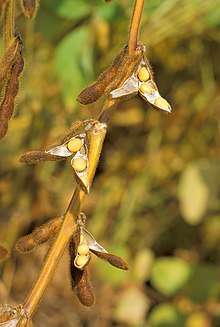Yeo Hiap Seng
Yeo Hiap Seng Limited (simplified Chinese: 杨协成; traditional Chinese: 楊協成; pinyin: Yáng Xiéchéng; Pe̍h-ōe-jī: Iûⁿ Hia̍p-sêng, Commonly known as Yeo's) is a Singaporean beverage company. It operates as an investment holding company as well as a drink manufacturer in Singapore and Malaysia. It is a multinational corporation that has offices and market presence in the US, Europe, Australia, New Zealand, Maldives, Mauritius, Mongolia, Pacific Islands, China, Hong Kong, Cambodia, Myanmar, Laos, Vietnam, and Japan. Yeo's also exclusively manages other international brands such as Allswell, Dutch Lady, Kickapoo, Red Bull and Uni-President.[2] Some of its house brands (See Below) include H-Two-O, Yeo's Asian Beverages, Justea, and Pink Dolphin.
.png) | |
| Public company (SGX: Y03) Subsidiary of Far East Organization | |
| Industry | Conglomerate |
| Founded | 1900 |
| Headquarters | Singapore |
Key people | Daryl Ng Win Kong, Chairman Melvin Teo, Group CEO |
| Products | Food and beverage, property |
| Owner | Far East Orchard (49.5% stake)[1] |
| Parent | Far East Organization |
| Website | www |
YHS majority shareholder is Ng Teng Fong's Far East Organization, which also develops houses and condominiums. The company also has operations in over 60 countries which includes Thailand, China, Singapore, Malaysia, United States and franchises in Indonesia and Mauritius.
History
Establish
The company has its history dated back to 1900. Founded by Yeo Keng Lian (Chinese: 杨景连), a native of Fujian, China, who began his business career by making soy sauce in Zhangzhou with the Yeo Hiap Seng Sauce Factory (Chinese: 杨协成) in 1901. Then he emigrated to Singapore in the 1930s, where he re-established the Yeo Hiap Seng Sauce Factory in 1938.[3][4] Yeo died in Singapore in 1960.[3]
The name Yeo Hiap Seng is of Christian origin with Hiap Seng meaning unity of Christ as Yeo was Presbyterian.[3]
Corporate
Although founded in 1938, the company was incorporated in Singapore on 20 December 1955 as Yeo Hiap Seng Canning and Sauce Factory Private Limited and was listed on 7 November 1968 and renamed to its present shorter name.
The 1950s saw the company can curry chicken, pioneer the bottling of soy milk, and package Asian drinks in Tetra Brik aseptic containers using the Ultra-high temperature processing system.
1990s and beyond
In June 1995, Robert Ng took over as chairman of Yeo Hiap Seng (YHS). His chairmanship came at the same time as his family increased its stake in the company to 24.9%, just short of the 25% threshold above which they would be required by law to make an offer to buy out all other shareholders. This marked a step forward in his fight with Malaysian billionaire investor Quek Leng Chan for control of YHS and its land holdings in Singapore's Bukit Timah district, which could be worth billions of dollars were they redeveloped into residential real estate.[5] In the end, Ng and his father were able to successfully take advantage of squabbles within the Yeo family to buy up 86% of YHS' stock.[6] Their battle to gain control of the company was later described as "one of the most colourful take-over struggles in Singapore's history" and led to YHS' transformation from a food company to a luxury real estate developer.[7]
See also
- List of food companies
- Vitasoy -Hong Kong-based soy beverage giant
References
- Ho, Frankie (20 June 2012). "The Far East Re-organization". The Edge Singapore. pp. 18–20.
- A. B. Susanto; Patricia Susanto (24 January 2013). The Dragon Network: Inside Stories of the Most Successful Chinese Family Businesses. John Wiley & Sons. pp. 61–. ISBN 978-1-118-33940-4.
- "The Yeo Hiap Seng Story - Testimony of God's Grace". dannysao.blogspot.ca.
- "History & Heritage". www.yeos.com.sg.
- "Tea for Two: Battle for a Great Name and Address", CNN Asianow, 28 July 1995, archived from the original on 6 February 2009, retrieved 5 June 2009
- Backman 2001, p. 96
- Porter, Barry (1 June 1997), "Transforming a soft-drink sluggard", The Standard, archived from the original on 7 January 2013, retrieved 15 July 2009
Bibliography
- Backman, Michael (2001), Asian eclipse: exposing the dark side of business in Asia, J. Wiley, ISBN 978-0-471-47912-3
